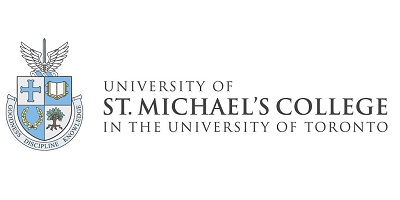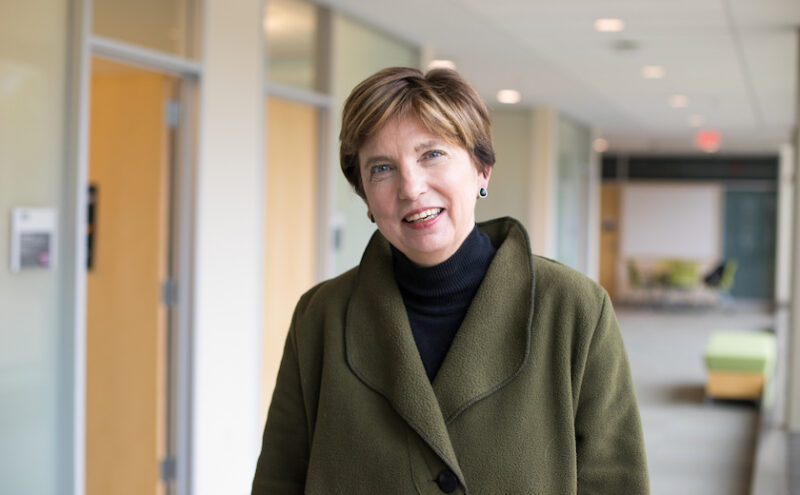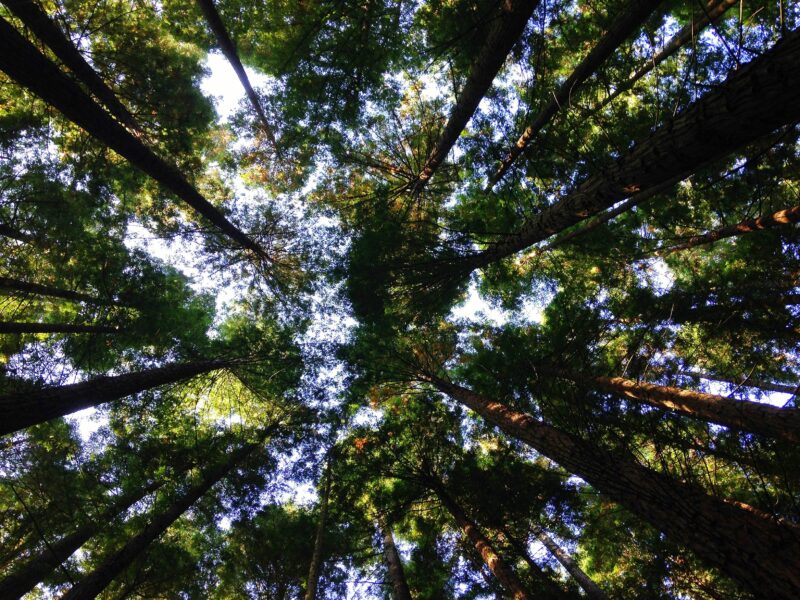A new project from the Regis St. Michael’s Faculty of Theology (RSM) will offer educators the tools needed to help adolescents deal with the growing challenge of climate anxiety.
Climate anxiety – also known by such terms as eco-anxiety, climate grief, or climate trauma – refers to the negative impact climate change can have on mental health. Numerous surveys indicate the experience of worries and fears for the future brought on by climate change is growing and is particularly intense among adolescents and young adults.
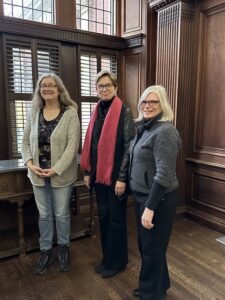
Now, RSM Professors Hilda Koster and Cynthia Cameron are launching Critical Conversations in Catholic Education: Climate Change and Eco-Social Resilience, a series of free workshops and a conference designed to engage educators in a conversation about how best to support adolescents and young adults in the face of a rapidly changing world.
“Young people are caught in a moment of feeling overwhelmed, and feeling hopelessness in the face of it all,” says Koster, who is an Associate Professor of Eco-Theology and the Director of the Elliott Allen Institute for Theology and Ecology. She also holds the Sisters of St. Joseph of Toronto Chair in Theology at RSM.
Climate anxiety “is a spiritual problem, and not just a problem of morals. It’s an existential issue,” she says, noting that the syndrome can result in apathy, isolation, and depression. “It’s hard to feel connected when you are anxious.”
Koster notes that while many Catholic schools now include Laudato Si’, Pope Francis’s groundbreaking encyclical on the environment, in their curriculum, there is a new but growing body of research and literature on climate anxiety that teachers may not be aware of yet. The two professors plan to draw on familiar spiritual resources such as Laudato Si’ (also referred to ‘On care for our common home’), which was promulgated in 2015, while also introducing newer materials specifically addressing climate anxiety.
“We want to help school boards and teachers connect the dots between the ecological, religious, and mental health aspects of this issue,” says Cameron, who is Assistant Professor of Catholic Education at RSM and holds the Patrick and Barbara Keenan Chair in Religious Education. Everyone working in a Catholic school is a religious educator, she notes, and so findings ways to help students develop resilience in the face of climate anxiety touches everyone from the chaplain to English, science and health teachers, for example, through to administrative staff.
The project is designed primarily to address issues emerging in the Grs. 7-12 range, with particular emphasis on the high school years, Cameron explains, noting there is a “confluence of anxiety and depression that begins to increase around the age of 11 or 12.”
While the Critical Conversations workshops will be presented through a Catholic lens, many of the lessons learned will be applicable to all students regardless of faith tradition, she adds.
Doctoral candidate Rosemary Boissonneau, who is also working on Critical Conversations, sees the project being particularly helpful to new teachers. While not the target age of the project, many young teachers are also facing their own climate fears, she says, questioning, for example, the risks their own children may face if climate change is not controlled. These personal worries come as they work with students who are extremely stressed by the topic – one of the factors that can lead to teacher burnout, says Boissonneau, a teacher herself.
The first workshop will be led by Cameron and Koster, focussing on the topic of “Climate Anxiety, Education, and Catholic Social Teaching” In addition, there will be a presentation by teacher and alumna Gabrielle Chan on her research for her Master of Theological Studies thesis on “Laudato Si’, Climate Anxiety and Youth.” Boissonneau will speak on her work as an educator, climate activist with “Fridays for Future” and “The Laudato Si’ Movement,” and a biblical scholar.
This workshop is co-sponsored by the Halton Catholic District School Board and the Dufferin-Peel Catholic District School Board and takes place on Wednesday, February 21 from 4:30-6 pm at St. Francis Xavier Secondary School, 1145 Bronte Street South, Milton, with an online option available.
The second workshop, “Science, Suffering, and Eco-Theology,” will be held on Wednesday, April 17, will include a presentation by Prof. Adam Hincks, S.J., who is Assistant Professor and the Sutton Family Chair in Science, Christianity and Cultures at St. Michael’s. He will be joined by RSM’s Prof. J.P. Fortin, who is Associate Professor of Practical Theology, and doctoral student Deanna Zantingh, whose research area focuses on Indigenous youth suicide and environmental devastation. Sr. Mary Anne Francalanza, fcJ, a science teacher who is working toward a diploma in Theology and Ecology will also be speaking. This second workshop is sponsored by the Durham Catholic District School Board at its Pope Francis Conference Centre, at 652 Rossland Rd. W. in Oshawa. This event will also be offered online.
While the workshops are designed primarily for teachers, the concluding day-long conference will have a broader audience, including students from the Toronto School of Theology and various faculties and departments at the University of Toronto. Youth, Climate Anxiety and Religious Education, which takes place on Saturday, Oct. 5 on campus, will feature Prof. Joyce Mercer, a professor of practical theology and pastoral care at the Yale Divinity School who has written on the topic of children and climate anxiety.
Along with a keynote address, the conference will include panel discussions, opportunities for networking, and tables of information.
“This project is a two-way street,” says Koster, who says that she and Cameron look forward to listening to and learning from the experiences of teachers working with adolescents to further their own work.
The Critical Conversations project is being funded by a Moving Forward in Mission grant from the Association of Theological Schools, RSM’s accrediting body. The professors note that the grant’s stated purpose reflects RSM’s commitment to serve the broader community, offering educational outreach to answer critical issues of the day.
Join Dr. Hilda Koster, the new holder of the Sisters of St. Joseph in Toronto Chair in Theology, at her first St. Michael’s conference November 11 and 12. Learn more about the conference from Dr. Koster’s description below.
- Thursday, November 11: 7 p.m. –8:30 p.m. ET
- Friday, November 12: 8:30 a.m. – 1:15 p.m. ET
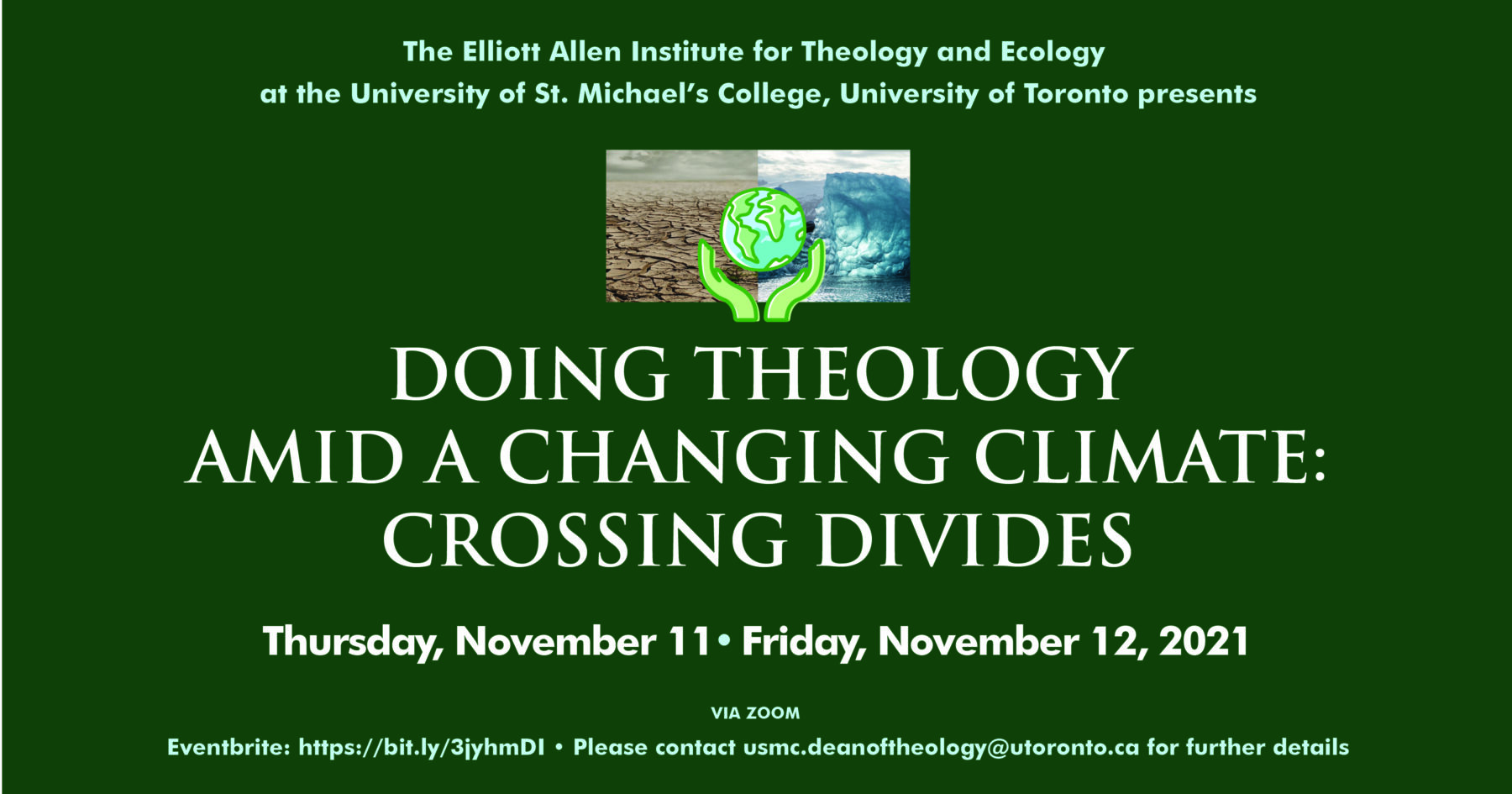
As world leaders gather at the COP 26 UN Climate Change Conference in Glasgow to implement the Paris climate agreement, the web-conference “Doing Theology Amid a Changing Climate: Crossing Divides” explores Christian theology’s contribution to the cultural, social, and spiritual transitions needed. Together with scientists and leaders from other faith traditions, Christian churches and communities have provided common witness on climate change. Yet because climate change is not simply an issue to be addressed but signals a need for a radical change in the way we inhabit a damaged planet, theologians and scientists discuss what more is required at this crucial geo-historical moment.
The speakers and panelists will ask how we can more effectively collaborate across disciplines and align our theology with cosmology and evolutionary science. How can we overcome divisions on climate science in a post-truth world? Which revelations of the sacred will nurture our interdependence with one another and the more than human world? And, as climate change further divides climate privileged and vulnerable communities along lines of race, gender, and ethnicity, how may theologians and community leaders work together to address questions of climate justice?
This conference is hosted by the Elliott Allen Institute for Theology and Ecology at the University of St. Michael’s College (Toronto), a leading interdisciplinary Institute for scholarship and dialogue rooted in the Catholic intellectual tradition.
Thursday, November 11
7–8:30 p.m.
A keynote speech delivered the night before by Franciscan Sr. Ilia Delio of Villanova University in Pennsylvania will set the scene for panel discussions of climate justice, gender justice, climate science and climate anxiety and the Church’s response. (The Catholic Register, Oct. 23, 2021)
Keynote: “Earth’s Fragility and the Crisis of Transcendence: Why Science and Religion Must be Reconciled”
Speaker: Dr. Ilia Delio, OSF Josephine C. Connelly Endowed Chair in Theology at Villanova University
Friday, November 12
Session 1: Climate Justice and Gender Justice: Addressing Inequities and Working across Difference (8:30 – 10:00 a.m.)
To many poor and minority communities, climate change means death and destruction on an ever-larger scale. Women and gender-diverse people are especially vulnerable. Speaking from various contexts and in solidarity with communities in both the global North and South this panel of renowned Catholic women theologians discusses these inequities and injustices with a focus on resource extraction and gender justice.
Session 2: Theology and Climate Science: Addressing Indifference, Fear, and Denial (10:15 – 11:30 a.m.)
To address climate change, theologians and climate scientists need to further engage in dialogue across disciplines. This panel explores the possibilities and challenges for this collaboration. How can climate science inform Christian theology? How can they both challenge religiously motivated climate change denialism? How can theology address fear and deep-seated anxiety about the consequences of climate change? What role do climate scientists see for the wisdom and power of religion and spirituality?
Session 3: Working across Ecclesial and Colonial Divides (11:45 a.m. – 13:15 p.m.)
Despite considerable ecumenical efforts towards a common witness, Christianity remains deeply divided on ethical issues, including climate change. Theologians representing various confessional and ecclesial traditions and communities address the challenges of ecumenical collaboration. Can Catholics come together with other Christians around the vision for climate justice and sustainability that Pope Francis unfolds in the encyclical Laudato si’? Can Christians from the global South and North work together to address issues of climate injustice amidst the enduring legacy of colonialism?
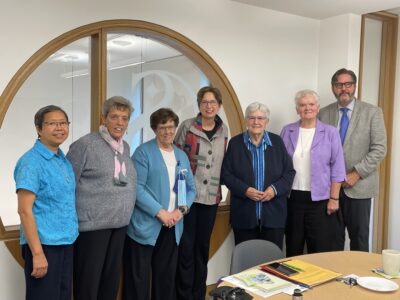
Dr. Hilda Koster, a professor of feminist theology and ecotheology, has been named the new holder of the Sisters of St. Joseph of Toronto Chair in Theology. Dr. Koster joined the University of St. Michael’s College’s Faculty of Theology in July 2020 and was appointed head of the Elliott Allen Institute for Theology and Ecology (EAITE) earlier this year.
“We welcome Dr. Hilda P. Koster to the Chair for 2022 onward and look forward to how her eco-feminist perspective will enrich theological studies for students and faculty,” says Sister Georgette Gregory, who is Congregational Leader for the Sisters of St. Joseph of Toronto.
Calling it “a great honour and pleasure” to be named Chair, Dr. Koster says she is grateful for the Sisters’ support for her work, and for that of the Faculty overall, noting that “this Chair reflects the Congregation’s longstanding commitment to theological education in feminist and ecological theology.
“The fact that this important Chair is now attached to the Faculty position in ecological theology offers important recognition of the leadership in the field of ecological theology that the Faculty of Theology, through the Elliott Allen Institute for Theology and Ecology, has provided for the past 30 years,” Dr. Koster says. “I look forward to a closer collaboration with the Sisters of St. Joseph of Toronto and hope to create opportunities for our students to learn from and get involved with the Congregation’s important eco-justice ministry and its advocacy work on clean drinking water.”
The Sisters of St. Joseph of Toronto established a Chair in Systematic Theology at St. Michael’s Faculty of Theology in 2007. Dr. Koster is the third person to hold the Chair, previously held by Dr. Margaret O’Gara and then Dr. James Ginther.
“We welcome this opportunity to support the Faculty of Theology, to commit to the advancement of theological education, and to honour the legacy of our Sisters at St. Michael’s College,” Sister Georgette says. “For 110 years we have contributed to St. Michael’s College as students and as educators in undergraduate and graduate studies. This includes opening St. Joseph’s College (1911 – 2006), a Catholic women’s college and residence. The Sisters and the University of St. Michael’s College will be forever linked by a shared dedication to Catholic education,” she says.
University President David Sylvester describes the Chair in Theology as yet another way the Sisters of St. Joseph of Toronto have offered invaluable service and inspiration to St. Michael’s.
“From teaching and administrative work to their mentoring and residence for students, the Sisters of St. Joseph of Toronto have shown extraordinary leadership at St. Mike’s for over a century,” he says.
“Dr. Koster’s work in ecotheology and feminist theology speaks to issues of critical importance to our world, echoing themes raised in papal documents such as Fratelli Tutti and Laudato si’. We are profoundly grateful for the Sisters’ support, which will help our students as they find ways to respond positively and productively to the concerns and challenges of the modern world,” he says.
Dr. Koster, whose courses this academic year include Our Common Home: The Origins, Theology and Implications of Laudato si’, will be hosting her first St. Michael’s conference in November. The online event, Doing Theology Amid a Changing Climate: Crossing Divides, takes place November 11 and 12 and includes keynote speaker Dr. Ilia Delio’s leture, “Earth’s Fragility and the Crisis of Transcendence: Why Science and Religion Must be Reconciled.”
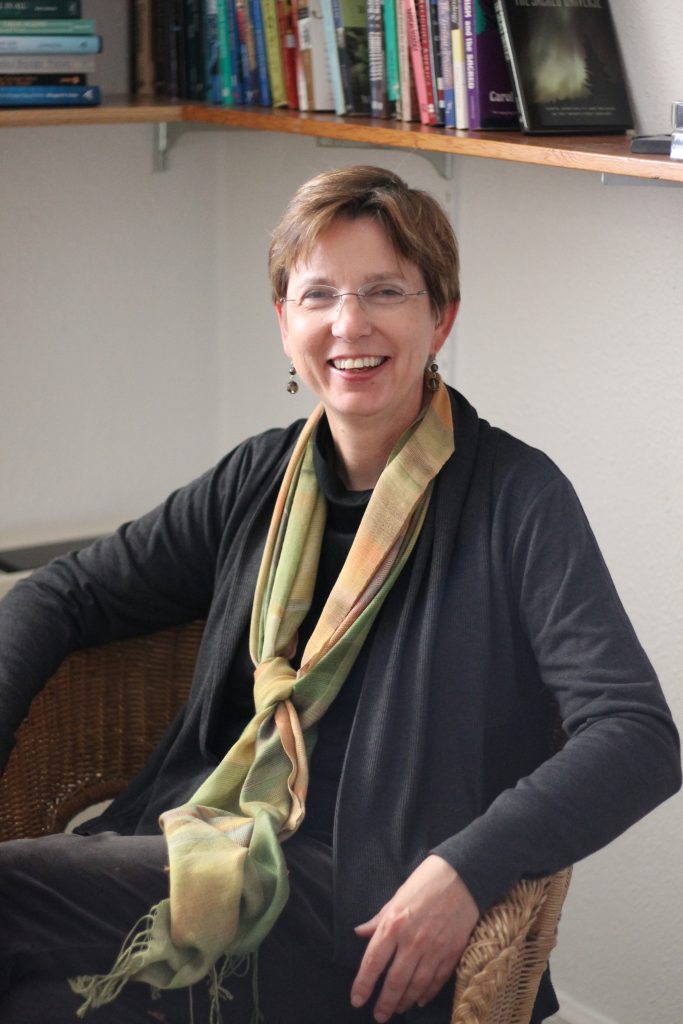
The new director of the Elliott Allen Institute for Theology and Ecology, Dr. Hilda Koster, sees the EAITE moving forward in the spirit of Laudato Si’, with particular attention to the needs and concerns of women, minorities and Indigenous communities.
The Institute, celebrating its 30th anniversary this year, was created by Fr. Stephen Dunn to address growing interest in the intersection between faith and the natural world.
“It is a great honour to be appointed Director of the Elliott Allen Institute, which has played such a prominent role in the development of ecological theology in Canada, especially by way of its sustained attention for the work of the visionary theologian Thomas Berry,” says Dr. Koster. “I am very grateful for the important work of the Institute’s founder Fr. Stephen Dunn, C.P., and his successor Dr. Dennis O’Hara. It is a privilege to carry their legacy forward.”
Strong leadership of the EAITE reflects the university’s core values expressed in St. Michael’s 180 strategic plan, says University President Dr. David Sylvester.
“We place great importance on our mandate to promote respectful dialogue on care for each other and for our common home. The work of the Institute helps to further St. Michael’s core values, and Dr. Koster will be an invaluable addition,” Dr. Sylvester says.
The Faculty of Theology is especially pleased to have found someone so well equipped to run a centre known around the world for its groundbreaking research and training, says Interim Dean Dr. John L. McLaughlin.
“Dr. Koster’s appointment as Director of the Elliot Allen Institute is good news not only for St. Michael’s but for anyone who cares about ecological theology as well as environmental and social justice,” Dr. McLaughlin says. “Since the EAITE was founded by Fr. Stephen Dunn in 1991 it has been shining a light on the kinds of issues Pope Francis addressed in his 2015 encyclical Laudato Si’: to recover our relationship with the natural world while also working for environmental justice.”
The need to examine ecological concerns in a theological light has never been greater, Dr. Koster says.
“Historically Christianity has not paid much attention to humanity’s relationship to the natural world but in light of climate change, overconsumption and species extinction this has become an essential area of theological reflection,” she says.
“Studying Theology and Ecology allows students to make connections between their faith traditions with knowledge of and appreciation for the more-than-human world. Yet ecotheology also will allow students to think deep and hard about the spiritual and moral challenges that result from our human caused destruction of precious ecosystems, and the suffering this is causing to vulnerable human communities.
“The Elliott Allen Institute therefore takes its lead from Pope Francis’ insight that ‘a true ecological approach always becomes a social approach; it must integrate questions of justice in debates on the environment, so as to hear both the cry of the earth and the cry of the poor (Laudato Si’, 49)’. We need educators, chaplains, social workers and scholars who have the competency to work with others to realize a more just and sustainable future for all, especially the poor.”
Born in the Netherlands, Dr. Koster received her Bachelor of Arts and Master of Divinity degrees from the University of Groningen. After further study at Princeton Theological Seminary and the Candler School of Theology at Emory University in Atlanta, she earned her doctorate at the University of Chicago. She joined St. Michael’s Faculty of Theology in July 2020, with teaching areas of ecotheology, feminist theology, and ethics. She assumes the directorship of the EAITE on July 1, 2021.
Describing the new Director as a “wonderful addition” to the Faculty, Rosemary Boissonneau, Dr. Koster’s research assistant, says Dr. Koster “challenges her students to look deeper and investigate theologically the conceptual frameworks and structures of domination underlying the socio-ecological crises of our times. I am confident that under her directorship, the Elliott Allen Institute for Theology and Ecology will be reinvigorated to continue its legacy as a vital centre of ecotheological learning and research.”
The EAITE is a collaborative teaching and research institute which offers a certificate of specialization in Theology and Ecology, as well as stand-alone Graduate Diploma in Theology and Ecology. Its interdisciplinary, collaborative nature brings a range of academic voices from the sciences and humanities into conversation on matters of the day.
The 10-course diploma is aimed at professionals and students who wish to integrate the study of environmental issues and theology in their professional careers, as well as for those who wish to study the theological and ethical dimension of environmental problems. It includes five foundational courses, one in-depth course, two ecology and theology-specifics courses, one experiential course, and one capstone course.
The newly revised certificate is open to anyone enrolled in any of the graduate programs at the Toronto School of Theology seeking to specialize in Theology and Ecology. Certificate requirements vary depending on the program being completed.
“The Elliott Allen Institute will continue to be a place for innovative theological education and scholarship, with attention to the voices of women, minorities and Indigenous communities,” says Dr. Koster.
For more information on the Elliott Allen Institute’s offerings, please contact Programs Coordinator Anthony De Feo or Dr. Koster directly.
Dr. John L. McLaughlin, Interim Dean of the Faculty of Theology, is pleased to announce that Dr. Hilda P. Koster will be joining the Faculty of Theology as an associate professor in Ecotheology. Dr. Koster comes to St. Michael’s from Minnesota’s Concordia College, where she held joint appointments in Religion, Gender Studies and Environmental Studies.
“The addition of Dr. Koster to our Faculty underscores the importance of both ecological and feminist theology to the University of St. Michael’s College,” says Dr. McLaughlin. “She will carry forward the groundbreaking teaching and research of eco-theologians Fr. Stephen Dunn and Dr. Dennis O’Hara, as well as the important work in feminist theology conducted by professors such as Sr. Ellen Leonard and Sr. Mary Ellen Sheehan.”
Dr. Koster will teach courses for the Faculty’s three basic degree programs—the Master of Theological Studies, the Master of Divinity and the Master of Religion Education degrees—as well as teach and supervise graduate students through the Graduate Centre in the Toronto School of Theology. In the 2020-2021 academic year her courses will include Introduction to EcoTheology, Catholic Social Teaching, and a new course titled Ecofeminism, New Materialism and Ecological Theology.
She will also help shape the activities and certificate program of the Faculty’s Elliott Allen Institute of Theology and Ecology (EAITE), which was established in 1991 to allow students to acquire a specialization in theology and ecology.
“The University of St. Michael’s College has been a leader in ecological theology through the Elliott Allen Institute. It is a privilege and an honour to further this tradition of visionary ecotheological education and scholarship,” says Dr. Koster. “My own work in ecological theology is done from an eco-feminist perspective. To me environmental and gender justice are interconnected.”
Born in The Netherlands, Dr. Koster received her Bachelor of Arts and Master of Divinity degrees from The University of Groningen. After further study at Princeton Theological Seminary and the Candler School of Theology at Emory University in Atlanta, she earned her doctorate at the University of Chicago.
Dr. Koster has published articles and book chapters on eco-feminist theology, and edited two books on Theology and Climate Change. The book Planetary Solidarity: Global Women’s Voices on Christian Theology and Climate Justice (Fortress, 2017), co-edited with Grace Ji-Sun Kim, gathers eco-feminist theological reflections on the intersection of gender and climate justice by feminist/womanist/mujerista theologians from both the minority and majority world. Together with Ernst Conradie, she published the T&T Handbook of Christian Theology and Climate Change (Bloomsbury, 2019) to create a dialogue between religion scholars, ethicists and theologians situated within a high carbon footprint context and those representing climate vulnerable communities in low carbon footprint world.
The Vatican has designated May 16–24, 2020 Laudato Si’ Week to mark the 5th anniversary of the completion of Pope Francis’s groundbreaking document Laudato Si’: On care for our common home. (The document was formally signed on May 24, 2015 and released on June 18, 2015.) The global campaign is sponsored by the Vatican’s Dicastery for Promoting Human Development, and is designed to spur Catholics to become more involved in environmental action.
Dr. Dennis O’Hara, who authored the reflection below, edited a book on Laudato Si’ with Matt Eaton and Michael Ross. The book, Integral Ecology for a More Sustainable World: Dialogues with Laudato Si’, brought together scholars from around the world with diverse backgrounds, including Chris Hrynkow, Cardinal Turkson, Brother Guy Consolmagno (Director of the Vatican Observatory), Sue Rakoczy, and John Haught. Drs. O’Hara, Eaton and Hrynkow are graduates of the Elliott Allen Institute for Theology and Ecology at the Faculty of Theology, and Michael Ross is an EAITE doctoral student.
Laudato Si’ Five Years Later
Even before its promulgation on June 18, 2015, the papal encyclical, “Laudato Si’: On Care for Our Common Home,” had created tremendous advance interest. At the time, I was serving as Director of St. Michael’s Elliott Allen Institute for Theology and Ecology (EAITE) and thus was frequently invited to speculate on the possible content of the encyclical, including on a student radio show, at a conference on religion and cosmology at Yale University, and in parishes of both Christian and non-Christian faiths.
Prior to its official release, I was given an advance copy of the encyclical so that I could prepare for the anticipated media attention. Interviews for radio, television, and newspapers punctuated the next several days, to be followed by talks at conferences, for school boards and NGOs, and in many parishes, both in Canada and Korea. This unprecedented interest was echoed in the encyclical’s enthusiastic reception at the 21st Conference of the Parties (COP21) of the United Nations Framework Convention on Climate Change at Paris in 2015, resulting in the Paris Climate Agreement. The encyclical inspired the formation of hundreds of new Catholic organizations to advance its goals, including the Global Catholic Climate Movement (a global network of 900 Catholic organizations) and the Catholic Climate Covenant as well as numerous initiatives of religious orders and the expansion of the work of Catholic NGOs to address an increased concern for our common home. It also spurred the interfaith project Living the Change, and the formation of the Vatican Dicastery for Promoting Integral Human Development. The encyclical continues to be favourably referenced in academic circles among diverse disciplines, including theology, ecology, economics, justice, social studies, healthcare, and more.
With the advantage of five years since its release, a retrospective assessment of Laudato si’ gives a fuller appreciation of its accomplishments. For decades, ecotheologians had acknowledged the Christian teaching that there are two books of sacred revelation—viz., scripture and creation—bringing a renewed focus to exploring the theological and ethical implications of a more sympathetic and scholarly reading of the latter. They had been pioneering a deeper understanding of humanity’s role within the epic of evolution and advocating for a more integrated understanding of the myriad of justice issues related to the ecological crisis. Pope Francis’ first encyclical validated their decades of innovative work.
The call of Laudato si’ to recognize the integral ecology of creation and to engage in conversations of respectful dialogue with diverse voices from all sectors of society, emphasized the intersectionality of ecological, ethical, economic, political, social, gender, and justice issues. Through such efforts, the encyclical articulated a more robust and integrated version of Catholic Social Teaching. Concurrently, it required the conversion of ourselves and our cultures, eschewing a consumerist individuality in preference for the health of the common good and our common home. As the magnitude and urgency of the ecological crisis in its multiple forms became better understood within more disciplines and by more people, the comparable magnitude, complexity, and intersectionality of this conversion also became more apparent.
Nevertheless, such awareness has not spurred an adequate response within either secular or religious institutions. For example, the concentration of greenhouse gases in the atmosphere continues to increase while the vitality of life on Earth declines despite generally universal calls for a vigorous reversal of both. This past November, the retiring president of the U.S. Conference of Catholic Bishops described climate change as “important but not urgent.” Yet as Msgr. Bruno Marie Duffe, secretary of the Dicastery for Promoting Integral Human Development warns, ” the alarming speed of climate change caused by human behavior and the choices we make threaten the very survival of species, water and air quality as well as food security. These are huge challenges…and the Paris Agreement is an absolute minimum and in fact does not go far enough.” Despite fine rhetoric, few nations are likely to reach the pledges they made with that agreement.
Laudato si’ continues to challenge this delinquency among nations and within its own Church. Its observations, assessments, and calls for action often serve as a standard against which efforts are measured or as an interlocutor that nurtures or guides responses to global crises. The contrast between the analyses and aspirations of the encyclical, and the anemic responses and sclerotic leadership still too often seen, shows that while the encyclical has had significant impact, the conversion it prescribes is far from realized. Like every good encyclical, Laudato si’ needs to be read and re-read to better understand and apply its message.
Professor Emeritus Dennis Patrick O’Hara is the former Director of the Elliott Allen Institute for Theology and Ecology at the St. Michael’s Faculty of Theology, where he taught from 2002-2019, and directed many theses in ecotheology and ethics. He was also an associate member of the graduate faculty at the School for Environment at the University of Toronto. In addition to teaching courses in ecological theology, spirituality, ethics, and sustainability, he has worked for the World Health Organization and Health Canada researching and preparing policy positions. He regularly delivers both popular and academic lectures in Canada and the USA but has also lectured in Europe and South Korea. Prior to becoming a theologian, he practised as a chiropractor and naturopathic doctor, and taught at colleges of both of those professions.
Moments of Grace and COVID-19
Basil of Caesarea, in Rule LV: Whether the Use of Medicinal Remedies is consistent with the Ideal of Piety, instructs that a serious illness can be sufficiently disruptive to our normal patterns of living that it can force us to consider the circumstances that led to our illness and to re-evaluate our choices so that we can once again align our life with the telos of God’s creation. This opportunity can be identified as a moment of grace, on a religious level.
Thomas Berry notes that moments of grace can also occur on cosmic and historical levels, such as the dispersal of primary element via the explosion of stars or the development of photosynthesis. Throughout the 13.8-billion-year history of the universe, change occurs when systems reach the most tension that they can creatively endure. At that point, systems evolve irreversibly by transforming into a new level of order and complexity by resolving the dangerous tension in an unprecedented way. In many respects, we are at such a moment, in part due to the COVID-19 pandemic and in part due to an ecological crisis magnified by climate change.
The people who are suffering the most due to the ecological crisis with its complex interwoven array of hardships will undoubtedly be least able to withstand the consequences of the COVID-19 pandemic with its threats to personal health and reduced access to supportive infrastructures. Both the ecological crisis and the COVID-19 pandemic are anthropogenic crises on a global scale, and both require a commensurate response. This pandemic has demonstrated the enormous actions we will take when we decide to act for the common good as a single Earth community. Despite decades of exasperating delay to curtail climate change, when faced with this pandemic, nations rapidly instituted measures to restrict travel, pause economies, enforce physical distancing, and impose domestic isolation. Perhaps such a collective and purposeful response could become a rehearsal for addressing Earth’s ecological challenges as we creatively seek ways of being that are mutually enhancing for us and the rest of the Earth community.
Pope Francis, in an interview with Austen Ivereigh from the University of Oxford concerning this pandemic, noted that the great uncertainty of this present moment is “a time for inventing, for creativity” because “every crisis contains both danger and opportunity: the opportunity to move out from the danger” through conversion, including “the decisive step to move from using and misusing nature.” Ecotheology reminds us that we have a common origin and share a common sacred story with all of Earth. We need to reframe our choices to better align with the creative dynamics and the telos of that story for we will go into the future as a single Earth community or not at all.
Read other InsightOut posts.

